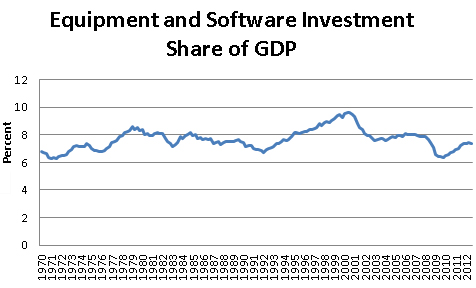December 15, 2012
The Washington Post has been an unofficial partner in the corporate sponsored Campaign to Fix the Debt’s efforts to cut Social Security and Medicare, devoting much of its news and opinion sections to advancing its agenda. This political position explains an article that examined the prospects for the U.S. economy after the budget impasse (a.k.a. the “fiscal cliff”) is resolved. The piece relied extensively on assertions from David M. Cote, a prominent deficit hawk and the CEO of Honeywell.
The piece quotes Cote:
“There is the possibility of a robust economic recovery if we are smart here. .?.?. If all of a sudden we can demonstrate that we can govern ourselves, we could affect the world.”
In this context it probably would have been worth mentioning that the interest rate on long-term Treasury bonds is just 1.7 percent. This fact suggests that most actors in financial markets do not share Mr. Cote’s concern about the ability of the United States to govern itself.
The piece relies further on Cote:
“He said the United States needs a tax-and-spending package of at least $4 trillion to be judged ‘credible’ by investors and trigger renewed growth. As head of Honeywell, he has frozen most hiring and capital investment because of uncertainty about the fiscal cliff — a strategy other corporate heads have followed as well to hedge against a new downturn.”
There is an easy way to evaluate this assertion. If what Cote is saying is true then we should be seeing unusually low levels of investment right now. In fact data from the Commerce Department show that, as a share of GDP, investment in equipment and software is only slightly below its pre-recession level. This is especially impressive given that large sectors of the economy are still operating well below their capacity.

Source: Bureau of Economic Analysis.
It is true that there has been some weakening of investment growth in the last half year or so, but even if investment returned to its growth rate in the first half of the year it would only have a modest impact on the pace of the recovery. In short, the data from the Commerce Department do not support what Mr. Cote is saying. If he in fact is delaying Honeywell investment because of uncertainty about the fiscal situation he is an exception among corporate decision makers.
This article also includes a bizarre comment in its discussion of the more rapid growth in the developing world in recent years, telling readers:
“But that could also sow the seeds of the next crisis if money floods into nations that are not equipped to manage it.”
The statement is of course true, but it is not clear what countries have demonstrated an ability to manage large inflows of money. Clearly the United States does not fit the bill.
Addendum:
A quick trip to Honeywell’s website indicates that the company does not appear to be putting its expansion plans on hold as Mr. Cote claimed. In the last two weeks it announced $20 million in new contracts to produce simulations for industrial companies, a new contract with Boeing, and the purchase of another company for $600 million.







Comments